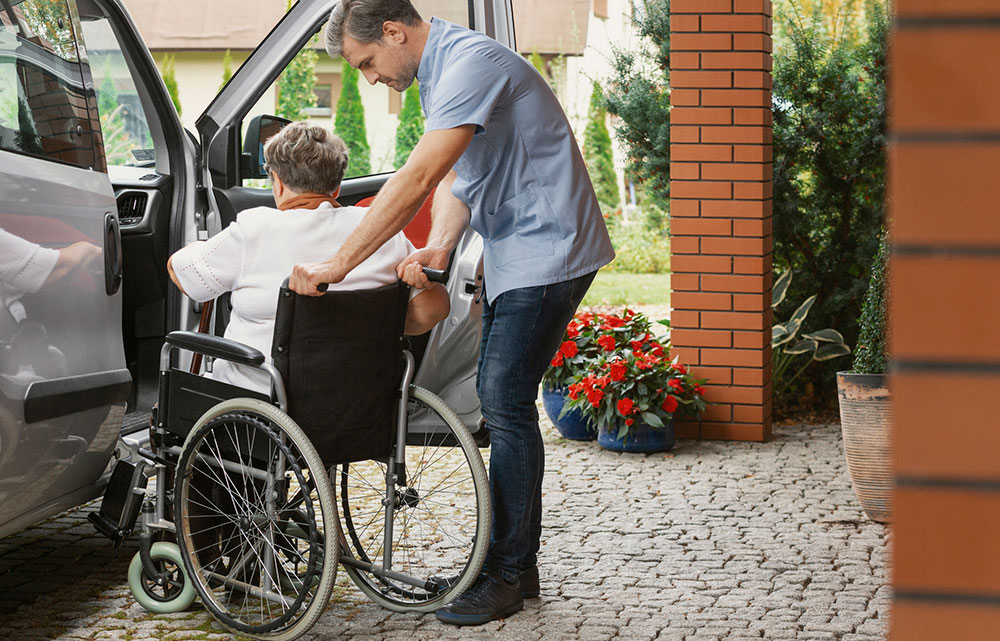BLOG
The Impact of Transportation in Adult Day Healthcare
August 21, 2024
Adult Day Healthcare (ADHC) is a crucial resource for seniors and adults with disabilities, offering comprehensive care, social interaction, and medical supervision during the day. However, the effectiveness of these programs is heavily dependent on one key factor: reliable transportation. Without it, many participants may face challenges accessing the care and social opportunities they need. In this blog post, we’ll explore the profound impact transportation has on Adult Day Healthcare and why it’s essential for the well-being of seniors.
Accessibility to Essential Services
Transportation services bridge the gap between home and care, ensuring that seniors can easily access Adult Day Healthcare facilities. For many seniors, particularly those with limited mobility or those who live in rural areas, transportation is the only way to receive the vital care that ADHC centers provide. Reliable transportation ensures consistent attendance, which is crucial for maintaining health and well-being.
Ensuring Access to Vital Medical Appointments
For seniors and adults with disabilities, attending regular medical appointments is crucial for managing chronic conditions, monitoring health, and preventing potential complications. Adult Day Healthcare centers often coordinate and facilitate these appointments as part of their comprehensive care services. However, without reliable transportation, participants may miss these critical medical appointments, which can lead to worsening health conditions and increased healthcare costs.
Transportation services ensure that seniors and adults with disabilities can attend their medical appointments on time, receive necessary treatments, and maintain their health. This accessibility is particularly important for those with mobility issues or who live in areas with limited public transportation options. By providing consistent and reliable transportation, Adult Day Healthcare programs play a vital role in ensuring that participants can adhere to their healthcare plans, ultimately improving health outcomes and quality of life.
Reducing Caregiver Burden
Caregivers often struggle to balance their responsibilities with the needs of their loved ones. Reliable transportation to Adult Day Healthcare can alleviate some of this burden, providing caregivers with much-needed respite. With transportation services, caregivers can rest assured that their loved ones are safely transported to and from the care center, allowing them to focus on work, personal responsibilities, or simply take a break

Improving Health Outcomes
Consistent attendance at Adult Day Healthcare centers can lead to better health outcomes for participants. Regular medical monitoring, access to therapy, and participation in health-promoting activities are all facilitated by reliable transportation. Without it, seniors may miss crucial appointments and activities, leading to a decline in their overall health. Ensuring transportation availability is a key factor in maintaining the health and well-being of ADHC participants.
Economic Considerations
Transportation services in Adult Day Healthcare are not just about accessibility; they also have economic implications. For many families, hiring private transportation or relying on taxis can be cost-prohibitive. By providing transportation as part of the ADHC program, these centers can reduce financial stress on families, making healthcare more accessible and affordable for all participants.
Conclusion
Transportation is more than just a means to an end; it’s a vital component of Adult Day Healthcare that impacts accessibility, social engagement, caregiver burden, health outcomes, and even economic stability. Ensuring that participants have reliable access to transportation can significantly enhance the effectiveness of ADHC programs, ultimately improving the quality of life for seniors and their families.
References:
- National Adult Day Services Association (NADSA). (2023). The Importance of Transportation in Adult Day Services. Retrieved from NADSA.
- American Association of Retired Persons (AARP). (2023). Transportation and Senior Care: Ensuring Accessibility for All. Retrieved from AARP.
- Centers for Disease Control and Prevention (CDC). (2023). Social Isolation and Loneliness in Older Adults: Opportunities for the Health Care System. Retrieved from CDC.
Find out more by speaking to our Team of Experts at routingbox.com
Ready for a Test Drive?
From the beginning, RoutingBox has remained committed to removing barriers for transportation companies attempting to provide access to healthcare and community services. Now, we want to help you.
